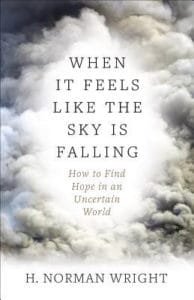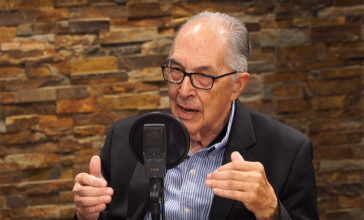
Homemade Meals for Busy Families
Mary Beth Lagerborg, co-creator of Once-A-Month-Cooking, discusses the importance of hospitality and how families can prioritize dinner time by cooking a month’s worth of healthy meals in one session.
Rescue 2x the babies from abortion!
Home » Episodes » Focus on the Family Broadcast » What to Do When Tragedy Impacts Your Family (Part 2 of 2)
Excerpt:
Dr. H. Norman Wright: …Because when you’re traumatized, you experienced a – a emotional and a cognitive shattering of your brain.
Jim Daly: Yeah.
Norm: And part is working over here, part is working over here, but we need to bring it together. It’s like we went through an emotional concussion.
End of Excerpt
John Fuller: Dr. Norm Wright wants to give you good, godly, Biblical help and hope for those unexpected crises that come in life. He’s back with us today on Focus on the Family. And your host is Focus president and author Jim Daly, and I’m John Fuller.
Jim: John, we had a powerful conversation last time with Norm, uh, talking about those stressful and challenging situations that catch us off guard in life, uh, where we feel maybe shocked, upset, even angry – where we’re asking, “Why is this happening to me?” Maybe we’re even asking God, “Why are you allowing this to happen to me?”
And there’s so many emotions that can be stirred in our heart at that time – resentment, bitterness. And maybe on the positive side, we get it, and we’re saying, “OK, Lord. Help us better understand how this will make me better.” And all of that is occurring, and it occurs at a different pace for everybody. And, uh, we’re going to learn more today about how to manage those circumstances as best as we can, how to see them through a godly perspective and how to continue to trust God in those moments.
John: We’d like to invite you to call us or go online and find help for your circumstances. Uh, we’ve got a lot of terrific resources, some caring Christian counselors. Our number is 800, the letter A, and the word FAMILY. Online, we’re at focusonthefamily.com/broadcast.
I do want to point out Dr. Wright’s great book When It Feels Like the Sky Is Falling: How to Find Hope in an Uncertain World. It’s a terrific resource, and we do highly recommend IT.
And, um, I should note that Norm has decades of experience in helping people deal with and overcome pain and trauma and grief. And, um, he said a lot of great things in the last broadcast, Jim. I really appreciated the wisdom, uh, that Dr. Wright had.
Jim: And Norm, let me welcome you back to Focus on the Family.
Norm: Thank you. It’s always good to be here.
Jim: It is. Uh, you’ve had so much experience helping people work through catastrophic events and natural disasters. You talked about last time, uh, shooting – school shootings, things like that – workplace violence. And you’ve been at it for 35 years in that particular area, in addition to marriage counseling and all your great work over decades.
Um, in that context, I was fascinated by the chapter in your book where you describe how traumatic events will affect the brain. So this is more the science of trauma, if we can spend a little time there. Most of us have heard about PTSD. It’s in the news more often with the war in Iraq and Afghanistan. For the people that don’t work in this area every day, what is PTSD? And why should we not be nonchalant about it? Maybe if we haven’t experienced it we may not understand it, and we kind of don’t give it the proper attention that it should get.
Norm: Well, PTSD – post-traumatic stress disorder – we seem to, uh, tie that into the service people, the ones that are, uh, over there fighting…
Jim: In combat.
Norm: …In combat, but the majority of people who experience PTSD are right here in our country. They’re everyday individuals. You’re driving down the street, and all of a sudden, somebody runs out in front of you, and you hit them. OK, you’ve been traumatized.
Jim: Huh.
Norm: …Because that was tattooed on my brain. Your brain is what takes the brunt of any type of a trauma, and it separates the functioning of the left and the right side. The left side is the thinking side and the talking side, and it’s got all the words and everything. The right side of your brain is – it doesn’t have any words, but it has pictures. And so the two things are not connecting the way they’re supposed to when you’ve been traumatized.
Jim: Huh.
Norm: There’s a picture in your mind. There’s a picture of that person running out, and it’s gonna pop out there when you least expect it.
Jim: How about the emotions of trauma? You know, again, we touched on that last time. There’s a variety of ways people respond, but particularly the impact of emotions that we may not even realize exists in us. We might see things that now are normal. We might be happy-go-lucky people, and then we go through something traumatic, and we start feeling depression…
Norm: Yeah.
Jim: …And it’s the first time in our lives!
John: Hm.
Norm: And you’re gonna ask yourself, “What’s wrong with me?”
Jim: “What has changed?”
Norm: Yeah.
Jim: “Why am I feeling this?”
Norm: And we need to counter that, “What’s wrong with me?” to, “This is normal. This is a normal response.” Part of the problem is that we don’t have words for everything that’s going on. That’s why, in the book, there’s a ball of grief that probably has maybe 15 or 20 different emotions there. And I use this constantly. I would hand it to you and say, “OK, which of these do you connect with?” And you’re looking to see, uh, oh, loss or anger or this and this and this. And you might look up and say, “Where did you get this? Did you draw this on me?” No, this is what we all go through.
John: Uh-hm.
Norm: And so I’ve had people who have been stuck in counseling until I hand them this ball of grief, and I say, “Could you identify what you’re experiencing?” And then I’ll just sit back and wait. And it could be I might sit there for five minutes while they’re just looking at it. Finally, they look up, and they say, “I’m experiencing this.” “Tell me about that.” You get them to talk about that. God is the creator of emotions. God is creator of us in a unique way. The Word of God talks a lot about imagination. Imagination is what goes on in our self-talk. And that’s tied in here. And we need to identify that as well.
Jim: You know, Norm, so often we look at these events as negative because it’s traumatizing. Uh, yet, the word itself has some interesting roots that offer us a very different perspective. Uh, I think in Chinese the term for trauma is made of two symbols – uh, one for danger, the other for opportunity…
Norm: Uh-hm.
Jim: …Which is really fascinating. Then our own English word is based on a Greek word which means to decide, which I would never put that together – that trauma is to decide. What is that expressing to us?
Norm: Eventually – and that’s important to mention – eventually, we get to the place where, um, there is something we can learn from the trauma. But right at the first, nothing makes sense to us, nothing really comes together. And what’s important is that – let’s say we have a friend who’s been traumatized. This is not the time to say to them, “You’re gonna learn something out of this. You are going to be able to glorify God out of this,” because that won’t register with you. You’re numb. Your brain took a concussion.
Jim: Hm.
Norm: It’s like you had an emotional and a cognitive concussion in your brain, and so you’re not thinking clearly. You’re basically able to, you know, make your breakfast in the morning, and that’s a big step. And that’s the way that we help people is just, what little thing could you do today that would be helpful?
Jim: Yeah.
Norm: And that’s all you’ve got to do.
Jim: Hm.
Norm: And they say, “Well, this is no big deal.” But it is because you’ve been traumatized. And that’s why it’s so important that they – they read through this because I’ve had so many people say, “When I read it, I realized that’s what was going on in my life. And guess what? I discovered I was normal. I don’t need to be fixed. Eventually, I will stabilize. And it’s gonna take longer than I ever realized.” And see, part of the problem – people want to know, how soon is this gonna get over with?
Jim: That’s everybody’s question, right?
Norm: Oh, yeah.
Jim: “When do I get back to where I was?”
Norm: Yeah. And they want to know that so that they can go on with their life. And one – one of the things I come out with and say – “This is probably gonna take months, maybe even years.” So we can relax and realize there’s nothing wrong with us that it takes us long. This is the way God has created us how to respond, and that’s really, really important.
John: Norm, that’s really important, I think, for those of us who are around somebody who has gone through a crisis or has been traumatized. I – I think it would be easy for a family member or a friend to eventually kind of tire of the processing, right? And – and this is a process that you don’t see it necessarily unfolding. I hear great encouragement from you though that we can offer hope to that person as they – as they deal with that.
Norm: We can offer hope, and we need to pray for patience if we’re not the traumatized person. If it’s somebody else, we’re gonna start thinking, I’ve heard this again and again and again. When will they stop saying it? Probably, they won’t stop saying it, uh, for months or maybe even years because even if they don’t say it around you outwardly, they’re saying it to themselves…
John: Yeah.
Norm: …And they’re reinforcing it again and again.
But it is so important that we have the freedom and the opportunity to face it. And that’s why there are steps in the book that can lead a person to the place where maybe they can get help from somebody else, maybe they can get help simply from reading a book, reading the Word of God…
And uh, we can say to the person that’s in trauma, “I wish I knew what to say to you and to help you, but I don’t.” People like that honesty.
Jim: Right.
Norm: …Because most of the time, they’re dealing with people that have come in and say, “You need to get on with your life. You need to do this. You need to do that.”
Jim: Why do we do that? I – I mean, it’s not humorous, but…
Norm: Because we’re uncomfortable with what’s…
Jim: Yeah, it’s our…
Norm: …Going on.
Jim: It’s our discomfort.
Norm: Yeah, it is.
Jim: So we want to just kind of say something and keep moving.
Norm: Yeah. Yeah. “I – I don’t know what to say, so let’s get on with it.”
Jim: Yeah.
Norm: That’s what it’s about…
Jim: Better to say nothing.
Norm: Yeah.
Jim: Norm, we’re – we’re moving into that area of becoming a survivor. Uh, and I’d like for people that are struggling – maybe they’re halfway through their grieving process, maybe three-quarters of the way. Use the adjectives that describe someone who is becoming a survivor. What does it look like?
Norm: Oh, there’s so many factors there. Um, one of the things that I like to do with individuals is to say, “Uh, you’re probably struggling with, uh – with this at this point, and you’re wondering, ‘I don’t think I can handle this.’” Well, it’s all right to say that – “I don’t think I can handle this” – if we get to the place where we turn it around and say, “But I can learn how to handle this. I learned to do this, I can learn to do that. I will recover.” Uh, you want to get to the place where you can get out the negatives but at the same time then move towards the positive.
Jim: Right. That’s a good sign, when someone is…
Norm: That’s a positive…
Jim: …Moving toward the…
Norm: …Sign.
Jim: …Positives.
Norm: Yeah. Um, being willing to ask for help. I went through, uh, open-heart surgery, and they gave me a whole list of things that I could do and a list of things that I couldn’t do. And being a man (Laughter) …I wanted to do it all (laughter).
Jim: You want to invert (Laughter) that list is what…
Norm: Uh…
Jim: …You wanted to do, being a man.
Norm: That’s right. (Laughter) And so, uh, I had to come to the place where I told myself it’s all right to ask my friends for help. And I needed to verbalize that with them. And they were – ah, they were saying, “Yes, because if you don’t do that, Norm, we’re gonna make you do it.”
John: Hm.
Norm: So…
Jim: Those are good friends.
Norm: They really were.
John: Yeah.
Norm: And they were very, very helpful. Um, we want to be responsible. We want to be, uh, adaptable. What I did before, maybe it’s not going to work now. So what can I find that’s going to work? That’s really important.
Jim: Well, in that context, Norm, of – of the loss of your wife, let’s get down to that practical example – being adaptable when your spouse is gone. How did that take shape? What did that look like to have a form of adaptability hen your wife passed away?
Norm: Well, there’s two things about it. One was we had four years of walking through brain cancer.
Jim: Hm.
Norm: And we did a lot of, uh, grieving in advance.
Jim: Yeah.
Norm: Uh, anticipatory grieving. And so that when she died, it was a little different because so much of the grieving was there. But I had to learn to live without. What happens when you have a spouse who dies? You didn’t lose just a spouse; you lost somebody who’s maybe the cook, who was…
Jim: Your best friend.
Norm: …Best friend, uh, your lover, uh, the errand runner and whatnot. I ask people to make me a list of all the other losses that they have experienced after their spouse died, and, um, we came up with about 40.
John: Hm.
Jim: Wow.
Norm: And if you identify these ahead of time, you won’t get ambushed by them so much. I remember about three months after, uh, Joyce died, um, I got a letter in the mail that said, “H. Norman Wright, widower.” And I bristled. How dare they call me that and label me that? It’s OK for me to say that, but why put that label on – on there at that time?
Jim: Hm.
Norm: But, um, I had to learn to live without. When you have a loss of a loved one, they’re no longer there. There’s a hole in your life. And, uh, you’re not gonna have people respond to you in the same way. For example, uh, couple groups – I couldn’t go to a couple groups. I was not a couple.
Jim: You felt like an outsider, I’m sure.
Norm: Yeah, you do.
Jim: You didn’t fit.
Norm: And, uh, eventually – and I have to emphasize this word because people who are listening want answers now. They want the fixing to occur now. But eventually you’ll get to the place where you’re able to respond in a way like you used to.
Jim: Yeah.
Norm: But it will take you – I can’t tell you how long that’s gonna take.
Jim: Right. Well, and, in fact, you – you mention the idea of moving to a new dream.
Norm: Yeah.
Jim: And what is a new dream – what is that like? – I mean, again, maybe in the context of the loss of your wife.
Norm: I have no idea what that new dream is like. Um…
Jim: But – but hoping for one – is that what you’re saying?
Norm: Hoping for one is there and, uh, pray, God, lead me in a new way. I don’t know where it is. I don’t know where it’s going, but I need your leading because I don’t have that ability.
John: Hm.
Norm: And sometimes there’s, uh, disappointments that turn around. For example, um, I’ve taught at Biola for many years, uh, which meant that any of my dependents could go to school there free. And so when my daughter hit, uh, college, I’m saying, “Yes.” And so she went to college for a year and then came in one day and said, “Daddy, um, I don’t think college is for me.”
Jim: Oh.
Norm: And boom, the disappointment. She says…
Jim: Oh, yeah.
Norm: “I want to go to cosmetology school. I want to learn this. Uh, I want to learn how to do nails.” And I’m sitting there thinking, and we’re talking and everything. Well, she went on and, um, fast-forward maybe three, four years later. Here is my daughter traveling internationally because she is the top nail artist, not just in the nation, but all over the world. She went to Japan. She went to…
Jim: Hm.
Norm: …Germany. She taught, uh, people how to do nails. Uh, she had books out. Uh, she – she had articles in magazines. And here is this daughter that didn’t go to college.
Jim: Right.
Norm: But look at how God used her.
And there was a time, though, when she went off in a different direction and, uh, was involved with some, uh, uh, uh, cocaine, with drinking and whatnot and then turned her life around. And then, uh, as she sat there in the, um – in the nail salon, she’d be doing somebody’s nails, and she’d be talking to them. And then, uh, she’d look at them and say, “How long have you been using?” “What?” “Yeah, how long have you been using drugs?” “Well, why did you say that?” “Oh, because of this, this, this, this. I have a therapist that I could send you to…”
Jim: Wow.
Norm: “…Because you’re using it.” And…
Jim: So she turned it into a ministry.
Norm: Oh, she turned it into – that was my daughter. You’ve heard about people who think outside the box. She didn’t know where the box was! (Laughter).
Jim: But – but this point you’re making is really critical, and some may have missed it. But being the father of this daughter, you had a different dream.
Norm: I did.
Jim: And then God had a different dream, too (laughter).
Norm: He had a dream that I…
Jim: He had a dream…
Norm: …Had to get…
Jim: …For your daughter.
Norm: …In line with…
Jim: Yes.
Norm: …Because she had an ability that very few people ever had. And I praised God for it.
John: This is Focus on the Family with Jim Daly. And our guest today is Norman Wright. And, uh, he’s written a number of books. The one we’re covering is Dr. Wright’s title, When It Feels Like the Sky Is Falling: How to Find Hope in An Uncertain World. Obviously, this is a difficult subject for many to hear. Uh, we know that you might need help and not know who to turn to. Focus on the Family is here. We have caring Christian counselors. We’ve got over 40 years of pulling together resources and help, and we would invite your call today. Our number is 800-A-FAMILY. And, uh, online, you can find the help you need at focusonthefamily.com/broadcast.
Jim: Dr. Wright, um, people do not like talking about suffering, especially in the Western culture. We run from suffering. We create gadgets that keep us from suffering. And, uh, you know, it’s not what we want to talk about. But the fact is the Bible addresses that topic a lot. Why is it important for people to recognize and accept that hardship and suffering are really part of everyday life, that even becoming a Christian does not eliminate hardship and suffering? In fact, it may bring it on. In, certainly, other parts of the world where there’s Christian persecution, you embrace the faith, you may lose your life.
But why as a human being, do we have this dichotomy, this kind of I don’t want to talk about or experience suffering, but the Scripture’s saying life is about suffering?
Norm: It’s not just suffering we’re reacting to. We don’t like change, especially if the change is outside of us. We like to be in charge of the change. And so even little changes, that’s disruptive. I don’t like that. Let me get back to the life that I had.
Jim: Hm.
Norm: And so you look at the Scripture, and the Scripture – the Bible is a book about grief. The Bible is a book about suffering. That’s life. And so instead of running from it, we want to embrace it. We want to reach out and bring it to us and say, “OK, this is something that’s disrupting my life, but that’s OK.” And we need to come to that place where we can, first of all, say that’s OK, even though I don’t feel it. Eventually, the feeling is gonna catch up, and then I’ll realize I can learn through this. This can be used for the kingdom’s glory. And, um, if we take that attitude, we feel like we’re more in charge again. And that’s really important – that, uh, I’m going to embrace this and see what I can learn through this.
Just like, um, with my son. Uh, he died at the age of 22, but he was only 18 months old mentally…
Jim: Hm.
Norm: …Because he was profoundly retarded.
Jim: Yeah.
Norm: I am indebted to my son for making me fully human.
Jim: Huh. Explain that if someone’s not catching it. How did he do that?
Norm: My son really couldn’t talk. He couldn’t feed himself. He couldn’t, uh – he wasn’t potty trained. Um, he would walk around the house for a long time. He might giggle a little bit. He might do different things. But, um, Matthew is not like you and I. But, uh, what he did was he caused me to look inside of myself because I was raised like most men – I did not understand feelings. I did not have a feeling vocabulary. Well, when Matthew came into my life…
Jim: Hm.
Norm: …He caused me to look deep within and to experience feelings that I’d never felt before. And he caused me to come up with a feeling vocabulary.
And so I could be able to talk with other individuals, I could help men who did not have a feeling vocabulary and say, “This is what happened, and this is what happened, and here’s what this word means.” When Matthew came into my life, I didn’t talk about feelings. I couldn’t cry. I couldn’t cry in front of my wife, Joyce, until one day, something happened on television, and I saw it from a different perspective, and I got up off of the couch, went into the kitchen, and I wept. I couldn’t even cry in front of my wife. But she didn’t let me get away from that. She came into the kitchen and just held me. And I learned to cry in front of her. Now I cry at the drop of a hat.
Jim: Hm.
Norm: And I never apologize for crying. And, um, I use a lot of feeling words, and I teach a lot of men how to use a new vocabulary so they can connect better with the people in their life. And so that’s what my son did for me.
I’ll never forget the day the hospital called and said a very generic phrase – “You need to be here immediately.”
Jim: Hm.
Norm: That’s all they said. And I knew what it meant was my son was dying, and he did. And when Matthew died, it was a very different experience. We walked into the room. He had eight tubes in him. He had a ventilator, and the doctor said, “In the next few minutes, the monitors, his blood pressure, heart rate, everything will diminish.”
Jim: Yeah.
Norm: And I stood there, and I watched the monitors start to change – the most unbelievable sense of loss coupled – coupled with a sense of joy. And that joy was there because my wife turned to the doctor and said, “Oh, you mean – (emotional) you mean today he’s going to be with Jesus.” And the doctor smiled and said, “Yes, this is that day.”
Jim: Yeah. Norm, that’s powerful. I mean, I so appreciate your heart and what you’re sharing.
Uh, I think this is a critical last question – um, explain, if you can, why silence about past experiences can be so deadly, so devastating to us. Not only to us, but to those we care about, our family and friends – when we remain silent, when we suffer in silence?
Norm: I don’t think that we were called to live life in isolation, and that’s what happens when we have silence. And I have to reframe the word silence because many times we think people are being silent, the only silence is sharing with others because they are talking to themselves again and again and…
Jim: In probably a raging conversation inside.
Norm: Oh, my goodness.
Jim: Yeah.
Norm: It goes on and on. And so if we can share that in the presence of another person and realize that as I’m sharing this personal experience in my life, I am being accepted for who I am and what is going on in my life. And they just sit there, and they listen to me. But basically, the way they’re ministering to me is through their presence.
Jim: Yes.
Norm: The way you help other people is by your presence.
Three months after Joyce died, I went in to get some blood-work done. And the PA said, “Dr. So-and-so will be in a minute.” And I’m thinking, “Why is he coming in? I don’t have an appointment.” And he opened the door, took one look at me, and I lost it; I just wept. And he came in and sat down, looked at the floor for two minutes until I composed myself, and then he started chatting with me. And we talked together. And we laughed together. And we cried together. And 15 minutes later, he got up and shook my hand, walked out. And I thought, this busy doctor who sees 50 people a day, who has 15 on his staff, gave me – he gave 15 minutes of his life, just his presence. He didn’t do anything.
He said, “Norm” – basically, “I’m here. Tell me your story.”
And there’s so many people out there who are listening that need to tell their story. Write it out. Find somebody who’s safe. Tell them what you need. It’s OK to say, “I don’t want you to talk. I don’t want you to reflect. Just be there. Hold my hand. Listen. And that’s all I need. And thank you.”
Jim: Boy, that’s beautifully said. Norm, I’m thinking of Jesus. He’s called the great physician. He’s the doctor of our soul. And like a broken arm, when we go through tragedy and grief, something is lost, something is broken. And the Lord comes along and restores as a great healer. And that is a wonderful place to end today.
Thank you for the way you have expressed your experiences, how you have helped people and how you have written this wonderful book, When It Feels Like the Sky Is Falling: How to Find Hope in An Uncertain World. So many people feel like that. And I hope, if you’re in that spot, let us be that friend. Call us. We’ll talk with you. And we have caring Christian counselors who can take it to other levels, if necessary. And hopefully, you’ll want this resource. We’ll get it into your hands. If you can’t afford it, don’t worry about it. Others, I believe, will take care of that. If you can help us financially, that would be great.
John: We do invite that donation. Whether it is a monthly pledge, or one-time gift, anything you can do will be greatly appreciated. Our number is 800, the letter A and the word FAMILY, 800-232-6459. online we’re at focusonthefamily.com/broadcast.
And as Jim said, reach out to one of our counselors, we’ll have to schedule a time for them to call you back. That initial consultation is for about half-hour or so, and it is free. So please, take advantage of those caring Christian counselors.
And by the way, if you make a contribution of any amount to Focus on the Family today, either that monthly pledge or one time gift, we’ll say “thank you” by sending you a copy of Dr. Wright’s great book, When It Feels Like The Sky Is Falling.
Coming up next time, giving hope to teen girls facing an unplanned pregnancy . . .
Teaser:
Mrs. Tricia Goyer: We just think I can’t do this. I don’t have enough strength. I can’t handle the people’s stares. I can’t handle the comments. But just know that God has a good plan for you and He can bring beauty out of something that’s really hard.
End of Teaser

Dr. H. Norman Wright is a licensed marriage, family and child therapist who had a private practice for over 30 years. He currently serves as Research Professor of Christian Education at the Talbot School of Theology. As a counselor and educator, his primary focus is in grief and trauma counseling and critical incident debriefings. Part of his work is offering training and curriculum in loss, crisis, and trauma to hospitals, health professionals, and social work organizations, as well as community wide grief recovery seminars. He has provided those seminars and his counseling expertise in the aftermath of traumatic events that have occurred around the nation including 9/11, Hurricane Katrina, and mass shootings. Dr. Wright is a prolific author, having written more than 90 books including Experiencing Grief, The New Guide to Crisis and Trauma Counseling, and Recovering From the Losses of Life. Learn more about Dr. Wright by visiting his website, hnormanwright.com.

Get Dr. Wright’s book When It Feels Like the Sky is Falling today!

Focus on the Family offers a one-time complimentary consultation from a Christian perspective.

Over time, the intensity of your grief will likely subside, but do not rush the grieving process.

Has God forgotten me? Does He hate me? Why does He seem to hide Himself?

Do you have any suggestions as to how I can come alongside someone who is grieving the loss of a spouse?

How can our church minister most effectively to victims of disaster and trauma?

How can I make sure that my children will recover from the emotional impact of disaster and trauma?

Dr. H. Norman Wright describes how traumatic events can affect your thoughts and behavior in unexpected ways.

Dr. H. Norman Wright discusses the grief he experienced with his mentally disabled son.

Visit our YouTube channel to watch a brief clip in which Dr. Wright describes how one church congregation responded to a tragic event in God-honoring ways.

Mary Beth Lagerborg, co-creator of Once-A-Month-Cooking, discusses the importance of hospitality and how families can prioritize dinner time by cooking a month’s worth of healthy meals in one session.

Scott Klusendorf, President of The Life Training Institute and Robyn Chambers, Vice President of Advocacy for Children at Focus on the Family, share strategies and encouragement in the pro-life movement. They offer compassion for abortion-minded women and speak up for pre-born babies. (Part 2 of 2)

Scott Klusendorf, President of The Life Training Institute and Robyn Chambers, Vice President of Advocacy for Children at Focus on the Family, share strategies and encouragement in the pro-life movement. They offer compassion for abortion-minded women and speak up for pre-born babies. (Part 1 of 2)

Larnelle Harris shares stories about how God redeemed the dysfunctional past of his parents, the many African-American teachers who sacrificed their time and energy to give young men like himself a better future, and how his faithfulness to godly principles gave him greater opportunities and career success than anything else.

Amy Carroll shares how her perfectionism led to her being discontent in her marriage for over a decade, how she learned to find value in who Christ is, not in what she does, and practical ways everyone can accept the messiness of marriage and of life.

Jonathan McKee offers parents practical advice and encouragement in a discussion based on his book If I Had a Parenting Do Over: 7 Vital Changes I’d Make.
